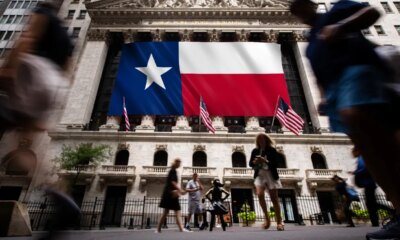Virginia
West Virginia treasurer warns new banks of ESG-based blacklisting

West Virginia State Treasurer
The blacklist is authorized in a 2022 state law
The treasurer can disqualify a restricted financial institution from the competitive bidding process or from any other official selection process; refuse to enter into a banking contract with a restricted financial institution based on its restricted status; and require an agreement by the financial institution not to engage in boycott of energy companies for the duration of the contract.
West Virginia State Treasury
The Treasurer’s Office has made an initial determination that the six institutions appear to be engaged in boycotts of fossil fuel companies as defined under state law. The determination was based on a review of each institution’s environmental, social and governance policies and other available statements, Moore said
The financial institutions, which were not named by Moore, received notices of potential inclusion on the list last Friday.
However, the
The institutions now have 30 days to submit a response. Unless the firms show to the treasurer’s office they are not engaged in a boycott of fossil fuel companies they will officially be placed on the list in 45 days.
One of the firms listed by the Times, HSBC, told the Washington Times it rejected the assertion it is a fossil-fuel “boycotter.”
The restrictions don’t apply to municipal bond issuances by the state because the Treasurer’s Office does not handle bond issuances. They mainly apply to the banking and cash handling functions of the office, which see about $20 billion in inflows and outflows a year. It also does not apply to state pension funds.
Under the 2022 law, the treasurer may exclude banks on the list from eligibility for contracts for state banking services.
It follows a
The first West Virginia list was published in July 2022 when Moore determined
Moore says the blacklist protects the traditional extraction industries of West Virginia.
The natural resources industry represents about 3% of West Virginia jobs, according to the West Virginia University’s most recent
“While the environmental, social and governance or ESG movement might be politically popular in California or in New York, financial institutions need to understand their practices are hurting people across West Virginia,” Moore said at the time.
Last week, Moore praised JPMorgan Asset Management and State Street Global Advisors for their choice to
“This is a step in the right direction and significant victory in our states’ fight against the international corporate collusion targeting the coal, oil and natural gas industries,” Moore said.
In January, Moore applauded the New York Stock Exchange’s decision to curtail the decision making freedom of private sector investors by withdrawing its proposal filed to Securities and Exchange Commission that would have allowed the public listing of Natural Asset Companies, climate-focused corporations designed to convert natural assets into financial capital by taking over land owned by private entities and individuals and the federal, state and local government.
Under the NYSE proposal, NACs would have had “the authority to manage the areas for conservation, restoration or sustainable management” and are prohibited from engaging in fossil fuel-related developments.”
In December, Moore blasted President Joe Biden’s ESG policies after his special climate envoy John Kerry pledged at the 28th United Nations Climate Change Conference that the U.S. would begin a phase-out of all existing coal-based power plants and urged that coal use be eliminated worldwide. Moore urged Congress to use its authority to block the agreements made at the summit.
“West Virginia and our coalition of states have been fighting for years against these efforts to boycott and curtail capital to our critical energy industries and diminish important economic activity and revenue for our states. This is a sign our efforts are making an impact,” Moore said Monday.
Last month, South Carolina
The bill,
It directs that all investment decisions made by the South Carolina Retirement System Investment Commission be based solely on maximizing the highest rate of return and not on ESG factors.
Other Republican-run states have followed Texas’ lead and enacted laws that have led to underwriter bans. Last year, the Oklahoma Treasurer’s Office produced a
Leaders in GOP states have also battled what they like to call “woke culture” in other areas as well. Wokeness, according to court testimony by an official in anti-ESG leader Florida Gov. Ron DeSantis’ administration,
Last year, DeSantis
The Florida
Last week, DeSantis unveiled
“The district’s recent audit report justified our shared concerns: Disney was acting as a law unto itself,” DeSantis said. “Since our reforms, the new district has taken bold action to increase transparency, community engagement, and fiscal responsibility, and has saved taxpayers $18.4 million.”
The CFTOD has implemented safety inspections by the Florida Department of Transportation, he said, for the Disney monorail system, saying it had lacked FDOT oversight before.

Virginia
Del. Dan Helmer on Virginia redistricting and congressional run

Virginia Delegate Dan Helmer led fellow Democrats to major gains in November’s election. Now he’s turning his attention to the redistricting of the Commonwealth, and a run in the newly proposed 7th district. He joins Sydney Persing on The Final 5 to discuss.
Virginia
Man shot, killed by Virginia trooper ID’d after crash ends in deadly stabbing attack

FAIRFAX, Va. (7News) — Virginia State Police have identified the man who was shot and killed by a trooper after a crash ended in a stabbing attack on Interstate 495 Sunday afternoon.
Jared Llamado, 32, of McLean, died at the hospital on Sunday after he was shot.
RELATED | 2 dead, dog killed after stabbing spree, trooper shooting on I-495 in Fairfax County
Investigators said Llamado was confronted by the trooper who opened fire around 1:17 p.m. The trooper was responding to a report of a road rage incident and found Llamado with a knife, according to a news release.
Four stabbing victims, all women, were also found at the scene, along with a dog that was also stabbed.
Michelle Adams, 39, died from her injuries. The dog also did not survive. The three other women were all taken to the hospital with serious injuries, according to VSP. 7News is not identifying the surviving victims.
Investigators said the stabbings stemmed from a crash in the southbound lanes of I-495.
The trooper who opened fire was not hurt and is on leave pending the outcome of the investigation into the use of force.
BE THE FIRST TO COMMENT
Investigators said they do not believe the attack is connected to terrorism.
Virginia
Two dead after I-495 road rage incident leads to stabbing, Virginia State Police shooting – WTOP News

A road rage incident led to a shooting involving the Virginia State Police on Sunday on Interstate 495. Four individuals were also stabbed.
Two people are dead Sunday in Annandale, Virginia, after a road rage incident led to a shooting involving Virginia State Police on Interstate 495.
A release issued by the Virginia State Police said a trooper fatally shot a man after responding to a report of a road rage incident on the southbound lanes of I-495 just before 1:30 p.m. at exit 52, near the Little River Turnpike.
The man, transferred to a hospital with serious injuries, has been pronounced dead. VSP said the trooper shot in self-defense after the man confronted him with a knife.
The trooper did not suffer any injuries during the altercation.
Officials found four stabbing victims at the scene, but only identified a 39-year-old woman and a dog. Both the woman and the dog died.
Early findings suggest the stabbings took place after a crash on the Capital Beltway. The crash remains under investigation.
The VSP’s release comes after the main lanes of the Capital Beltway Outer Loop, before Little River Turnpike, were closed to traffic for several hours, only recently opening the express lanes. Main lanes between Arlington Boulevard and the Little River Turnpike remain closed.
Stay with WTOP for the latest developments.
Get breaking news and daily headlines delivered to your email inbox by signing up here.
© 2026 WTOP. All Rights Reserved. This website is not intended for users located within the European Economic Area.
-

 World5 days ago
World5 days agoExclusive: DeepSeek withholds latest AI model from US chipmakers including Nvidia, sources say
-

 Massachusetts6 days ago
Massachusetts6 days agoMother and daughter injured in Taunton house explosion
-

 Denver, CO6 days ago
Denver, CO6 days ago10 acres charred, 5 injured in Thornton grass fire, evacuation orders lifted
-

 Louisiana1 week ago
Louisiana1 week agoWildfire near Gum Swamp Road in Livingston Parish now under control; more than 200 acres burned
-

 Politics1 week ago
Politics1 week agoOpenAI didn’t contact police despite employees flagging mass shooter’s concerning chatbot interactions: REPORT
-

 Technology1 week ago
Technology1 week agoStellantis is in a crisis of its own making
-

 Oregon4 days ago
Oregon4 days ago2026 OSAA Oregon Wrestling State Championship Results And Brackets – FloWrestling
-

 Technology1 week ago
Technology1 week agoArturia’s FX Collection 6 adds two new effects and a $99 intro version


















